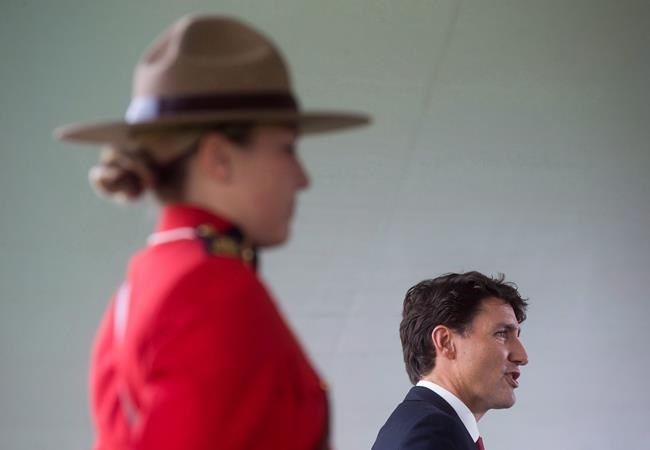OTTAWA — Naming an Indigenous person as the next commissioner of the RCMP is "an excellent idea," Prime Minister Justin Trudeau said Friday, but he cautioned against thinking that such an appointment would be enough to solve the force's problems.
His comment came in response a call from some First Nations leadership for the Liberal government to ensure the next top Mountie is Indigenous.¬Ý
Speaking to reporters in Winnipeg, Trudeau said, "I think it's an excellent idea."
"Seeing more and more Indigenous leadership throughout systems and institutions across the country, we should absolutely look at more diversity."
However, Trudeau said the decision will be made through an independent process, the details of which have yet to be announced.¬Ý
"We will always look to try and make sure the full diversity of Canada and Indigenous representation is part of our considerations."
Trudeau has made reconciliation one of his top priorities since taking office in 2015. Besides spending billions on various initiatives he named Mary Simon, an Inuk leader, as the first Indigenous Governor General.¬Ý
His office also confirmed Justice Michelle O'Bonsawin, an Abenaki member of the Odanak First Nation, as the first Indigenous justice for the Supreme Court of Canada.¬Ý
RCMP Commissioner Brenda Lucki plans to retire this month, just before the end of her five-year term.¬Ý
She was appointed in April 2018 and led the force during a chaotic few years that included the deadliest mass shooting in modern Canadian history, along with growing calls to defund the police and allegations of systemic racism in the force.¬Ý
When she was selected, Lucki became the first woman to permanently hold the role.¬Ý
The force, which marks 150 years in May, has faced criticism over its historic and current relationship with Indigenous people. The RCMP is the main police force for many First Nations, Inuit and Métis communities through contract policing agreements with the provinces and territories.
Officers have faced allegations of failing to properly investigate or take seriously the disappearances and deaths of Indigenous women and girls in Canada.¬Ý
In 2018, Lucki apologized to the families of some women who were part of an inquiry into the issue, saying that, "for too many of you, the RCMP was not the police service that it needed to be during this terrible time."
In June 2020, Lucki said in a series of media interviews that she "struggled with the definition of systemic racism." Those comments were met with sharp criticism, including from Indigenous leaders who pointed out she had pledged to improve relations with their communities.¬Ý
Afterward, she released a statement saying she should have more definitively acknowledged that systemic racism exists within the ranks of the RCMP.¬Ý
On Friday, Trudeau pointed out that choosing an Indigenous officer to lead the Mounties will not in and of itself fix the force's problems.¬Ý
"We have to understand that it's not just about putting the right person at the top of an organization that makes the systemic change necessary," he said. ¬Ý
"There is a huge amount of work on structures within our institutions, including the RCMP, to ensure that the entire force, the entire system, is fully respectful of Indigenous people, respectful of diversity."
An internal report of the RCMP's progress on reconciliation released in 2022 outlined its struggle to recruit and retain Indigenous members in its ranks.¬Ý
The report found that Indigenous representation had dropped to seven per cent in 2020, down from eight per cent in 2010.¬Ý
This report by The Canadian Press was first published March 3, 2023.¬Ý
Stephanie Taylor, The Canadian Press




